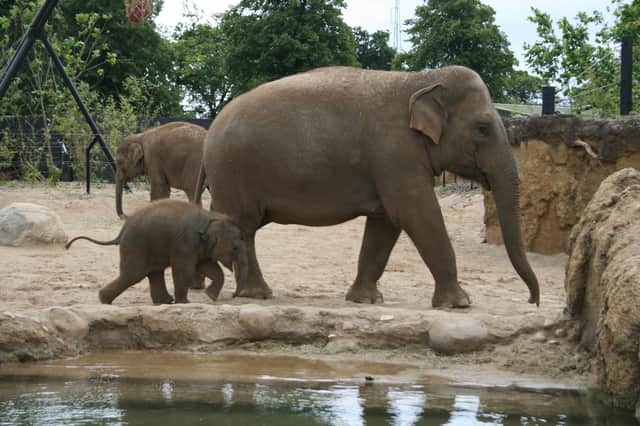If Dublin and London zoos were to close, it could affect other zoos such as Belfast


For instance Professor Christopher Dickman of the University of Sydney says that 800,000 animals have been destroyed recently in Australia and that it is a sad time for native species, many of which can’t be found anywhere else.
This relentless destruction brings into sharp focus the global destruction and extinction of wild animals. It is clear that there is a great urgency in taking positive steps to protect and conserve what’s left of the planet’s animal diversity.
Advertisement
Hide AdAdvertisement
Hide AdThis urgency was recognised and acted upon by the Irish government appointed committee to advise on the Dublin Zoo in its comprehensive report published July 1990.


The zoo was in imminent danger of closing in the late 1980s. To advise the government in dealing with this crisis a committee was established by cabinet, consisting of Mr Michael Doyle (Chairman), Mr Nicholas Jackson, Mr George Eaton and Mr Noel Pearson, to examine the structure of Dublin Zoo and come up with recommendations.
I was appointed secretary to the committee in 1989. The terms of reference were broad and open-ended. Our 200 page report was presented to government in July 1990.
We consulted a wide spectrum of zoological and marketing experts, including Dr M R Brambell Director North of England Zoological Society, Mr A G Greenwood, Yorkshire, Mr J J C Mallison, Jersey Zoo, Mr N L Jackson, Zoological Society of Wales and Mr Phelim McCloskey, Mosney Holiday Centre.
Advertisement
Hide AdAdvertisement
Hide AdThese experts were helpful and generous with their time and professional advice.
We commissioned market research on public attitudes to Dublin Zoo and we examined submissions from individuals and institutions, including the Dublin Society for Prevention of Cruelty to Animals, University College Dublin, Maynooth College and Trinity College.
Some conclusions that we came to are that there is a compelling need for developed countries to play their part in the education of their populations towards the wildlife of their country and the world and the need to involve their populations in the conservation of species which have lost their ability to survive in the wild.
The market research brought to light interesting results, apes (monkeys, gorillas) were the favourite animals, 69% followed by elephants,49%. There were preferential differences between men and women: females preferred Peacocks, 26%, compared to 12% for males.
All the individual zoo animal facilities were examined.
Advertisement
Hide AdAdvertisement
Hide AdRegarding the Orang-Utans the committee made a stand for female animal equality. It was noted that the large adult male would sit at the only entrance between the inside enclosure and outside viewing area, preventing two adult female Orang-Utans from going to and fro. We recommended a second entrance which solved the problem of accessibility.
To broaden the conservation work of the Zoo, Dr Christopher Moriarty wrote a paper on the possibility of including a world class aquarium.
The committee saw no reason why the Dublin Zoo, following restructuring and with state support, should not play a full role within the European zoo community.
The national survey by Lansdowne Market Research showed that the Irish public were overwhelmingly in favour of the retention of the Zoo and most Irish people accepted that zoos are necessary to preserve rare types of animals.
Advertisement
Hide AdAdvertisement
Hide AdOur final conclusion was that a new zoo structured on modern lines was vital for Ireland and which would play its part in the global zoological strategy for the survival of many endangered species.
We ended our summary with a quote from Baba Dioum, Senegal, “In the end we will conserve only what we love, We will love only what we understand, And we will understand only what we are taught”.
It seems that the Dublin Zoo is again facing the prospect of closure.
Over the summer, Sir David Attenborough has expressed concern that London and Whipsnade zoos will close.
Advertisement
Hide AdAdvertisement
Hide AdIf these zoos close, it could have a knock-on effect on the Belfast Zoo?
Micheal O’Cathail, Fermanagh
——— ———
A message from the Editor:
Thank you for reading this story on our website. While I have your attention, I also have an important request to make of you.
With the coronavirus lockdown having a major impact on many of our advertisers — and consequently the revenue we receive — we are more reliant than ever on you taking out a digital subscription.
Subscribe to newsletter.co.uk and enjoy unlimited access to the best Northern Ireland and UK news and information online and on our app. With a digital subscription, you can read more than 5 articles, see fewer ads, enjoy faster load times, and get access to exclusive newsletters and content. Visit https://www.newsletter.co.uk/subscriptions now to sign up.
Advertisement
Hide AdAdvertisement
Hide AdOur journalism costs money and we rely on advertising, print and digital revenues to help to support them. By supporting us, we are able to support you in providing trusted, fact-checked content for this website.
Alistair Bushe
Editor